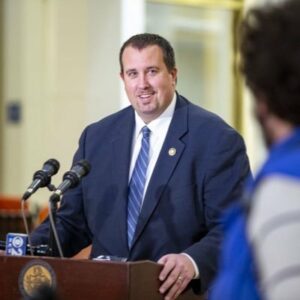There is an old saying among farmers and financial analysts: Don’t eat your seed corn.
That sums up what House Appropriations Chair Seth Grove (R-York) said in an hour’s discussion with the press Wednesday about Gov. Josh Shapiro’s $48.3 billion 2024-25 budget ahead of budget hearings. The Democratic governor wants to spend $3.7 billion more than the previous year or 8.4 percent.
Shapiro’s plan calls for spending more money than the state takes in and will burn through its general fund surplus and Rainy Day Fund by 2028-29, leading inevitably to tax increases, according to Grove.
The general fund surplus would be cut in half to $3.4 billion from the projected $7.1 billion.
In the current fiscal year, revenue is falling $209 million below projections. Revenue from personal income taxes is down by $306 million; non-motor vehicle sales and use is down by $29 million, and cigarette taxes are down by $17 million.
He said three agencies use 84 percent of the budget: Human Services, Education, and Corrections.
Grove referred to Shapiro’s “Christmas List” of requested spending, with an additional $1 billion for education topping the gifts.
Shapiro did not address the structural deficit, said Grove. His budget would “blow through” $15.9 billion of the general fund and Rainy Day Fund balances.
They are two separate funds. The Rainy Day Fund, now at $6.12 billion, was created for economic downturns like the 2009 recession, he said.
Because the state has a $6.2 billion surplus in the general fund, the treasurer does not have to borrow to meet expenses throughout the year, saving $10 million on interest payments “that we can use for other stuff,” he explained. The state also makes money from interest on the Rainy Day Fund, which is invested, he said.
“Over the next three years, (Shapiro’s) budget eviscerates that,” said Grove.
Grove claimed Shapiro “wants to be president,” adding Lt. Gov. Austin Davis might not want to run with Shapiro again because he’d be stuck raising taxes.
Two “revenue modifications” that Shapiro proposes are raising the minimum wage to $15 an hour and imposing a 42 percent tax on the daily gross from some electronic gaming machines (skill games). The increased wages could bring in $22.6 million in personal income tax and $34.1 million in sales and use taxes in 2024-25. And the skill games tax would bring in $150.4 million this year and $300 million annually in the following years.
But he said while Shapiro’s budget calls for $2.5 billion in new or expanded government programs, including for basic education, there’s no accountability. Grove noted the governor also plans to spend more on higher education.
“The big question is, do we have a balanced budget?” said Grove. “There’s one-time revenue propping up massive spending.”
“The big problem is we’re growing (the budget) at 2 percent based on the basic education ($1 billion in additional funding) he has,” said Grove.
“It’s a compounded problem…the general fund balance goes to zero, and then you start on the Rainy Day Fund,” said Grove. “And we’re out of all surplus in 2027-28.”
“Everything sounds good when you want to give puppies and kittens and chocolate and candy to everybody. But there’s a cost to that,” said Grove.
Grove said the income tax would be raised by 6.3 percent to cover the budget gaps, noting Democrats prefer to raise income taxes rather than other taxes, like the sales tax.
And if they shift taxes so the wealthy are paying more: “If you have money, you’ll be out of here in two seconds.”
“If someone finds a new tax that we didn’t propose, I’d be shocked,” he said, listing various taxes, such as the hotel tax, that the legislature has considered over the years. “You need a major tax source to cover billions of dollars.”
“Based on this budgeting (Shapiro) is going to be good for reelection, all this spending without raising taxes,” said Grove. “Financially sound, yada-yada.”
But eventually, taxes will need to increase. Unlike the federal government, the state can’t print money.
Personnel costs are increasing under Shapiro, Grove pointed out, including $2.1 billion for pending contracts for the state police and corrections officers. Employees have increased by 1,200 people, and so have salaries. Total salaries are up 4.8 percent. The average state employee’s compensation is $114,752, including benefits. Overtime expenses have also increased, reaching $372 million for 2022-23, up from $351 million for the prior year.
Shapiro also penciled in $161 million more for SEPTA, bringing the total state funding to $1 billion. Grove said the counties served by SEPTA should increase their share of SEPTA funding.
“They need skin in the game as well. I have not seen one county propose new revenue or new taxes,” said Grove, who also noted SEPTA’s money woes stem from falling ridership due to passengers’ safety fears. He said the legislature passed a bill for a special prosecutor for SEPTA areas that Shapiro signed. The attorney general has not yet hired that prosecutor in the face of opposition from Philadelphia District Attorney Larry Krasner, and a 30-day deadline has passed.
The Shapiro administration said, “The Commonwealth is projected to have a total budget surplus of $14 billion at the close of June 2024. This sum factors in federal funding received during the COVID-19 pandemic and nearly $7.2 billion in the Rainy Day Fund.
“Even if every one of the initiatives in the governor’s budget is fully funded, Pennsylvania will still have an $11 billion surplus by the end of Fiscal Year 2024-25. This is on top of the fact that the governor’s vision maintains a balanced budget and does not raise taxes.”

